A cybercriminal by the name ‘theredhand’ claimed to leak data from Brazilian agrotech companies on the breach forum. They have data from over 150 companies that are linked to Brazilian agriculture.
Theredhand further wrote that they targeted the companies because they take financial advantage of Brazilian ‘coffers’ that are meant to be used for the preservation of the Amazon, biomes, and other organizations.
FalconFeedsio tweeted about the data breach at Brazilian agrotech companies that allegedly targeted state and private banks, non-governmental organizations, and private companies associated with the Brazilian agriculture companies.
Data leak from Brazilian agrotech companies

The hacker apparently gained access to the systems after exploiting a front private company. The hacker accused the company of having no commitment to the cause it claimed to be having at its position. Theredhat offered a symmetric key to decrypt the encrypted and exfiltrated data from the Brazilian agrotech companies.
Research around threats to the food and production sector
Agriculturists are increasingly employing technology to automate processes and gain better insights into weather conditions, crops, fertilization, etc. Cybercriminals have been found to launch ransomware attacks to disrupt services that would have an impact on corresponding food services, moreso, in economically struggling countries.
The FBI warned the Food and Agriculture sector with reports of over six ransomware attacks on grain cooperatives in 2021.
Targeted attacks on the agriculture sector during critical times
LockBit 2.0 ransomware attack on a multi-state grain company drew attention to targeted cyberattacks aimed to disrupt services. The target provided grain processing, fertilizer, seed, logistics, etc., which are part of the critical services required to be rendered during the spring planting season.
Although, a stitch in time also prevented a disaster from two ransomware attacks that were launched on a feed milling company in 2022.
Researcher and Canada Research Chair, Dr Ali Dehghantanha highlighted the need to increase cybersecurity in the agriculture sector before the issue goes out of reach. On-farm smart technologies are getting adapted extensively in most countries to cater to the increasing demand for food, growing urbanization, and climate change.
Dr. Ali reiterated the need to secure interconnected devices that render precision agriculture technology. “But all those interconnected sensors, smart meters, cameras, and other devices leave farmers more vulnerable to data insecurity and potential cyberattacks,” the director of the University of Guelph said in the university’s news report.
Speaking about state-sponsored hackers, he said that those are the cybercriminals that pose the maximum danger to the systems related to agriculture. Because it could result in disrupting networks, losing access to processes, losing crops, monetary loss, and affecting food security.
In the middle of wars or conflicts between two or more nations such as the Russo-Ukrainian war, targeting the food and agriculture sector can lead to breaking the opponent by impacting basic necessities.
Fixing smart farm machinery
According to a BBC report, agriculture manufacturing companies are now looking to work on vulnerabilities and fix issues in hardware and software to prevent global supply chains from threats.
John Deere, a prominent agricultural manufacturer spoke to the BBC and stressed on the need to prioritize machines and data and monitoring agricultural robots that minimize human involvement.
“There is a real risk that people anywhere in the world could try and take control of these machines to get them to do whatever those people want…,” said Chris Chavasse, the co-founder of Muddy Machines to BBC.
